#erzherzogin
Explore tagged Tumblr posts
Text

Maria Theresia im gelben Kleid. Von Alois Hans Schram.
#alois hans schram#magyar királyság#königreich ungarn#kingdom of hungary#erzherzogtum österreich#haus habsburg#kaiserin#holy roman empress#heiliges ròmisches reich#full length portrait#house of habsburg#österreich#kaiserin maria theresia#maria theresia von österreich#erzherzogin#archduchess#queen of hungary#full-length portrait#alois schram
14 notes
·
View notes
Text

Mary of Burgundy. Unknown artist.
#marie de bourgogne#duchesse de bourgogne#duché de bourgogne#maison de valois#valois bourgogne#mary of burgundy#duchess of burgundy#burgundy#erzherzogin#royaume de france#haus habsburg#engravings#house of habsburg#engraving#archduchess#royalty
11 notes
·
View notes
Text

Archduchess Sophie of Austria to her son Archduke Karl Ludwig, on her namesake granddaughter Sophie:
November 30, 1855, Hofburg ... Before I wrote to you, I was at the [portrait] session which the dear little girl [the 10-months-old Archduchess Sophie] is giving in Fr: von Welden [Sophie's Aya]'s room to Schrotzberg [paintor], who is painting her on behalf of E[mpress] Car[oline Auguste] as a Christmas Eve surprise for Sisi. I was also inside after the 10 o'clock mass, as the little one can only sit in bits and pieces between her Mama's visits and those she pays to her. This morning we were all startled by the sudden announcement that Sisi was coming. The picture is already strikingly similar; but the dear little one is also too sweet and friendly, especially when I sit opposite her, as she is very gracious to me; my tortoise shell glasses, which she likes to bite and loves passionately when teething, are the binding agent between us; she cheers, claps her fat little hands together, laughs and is happy that it refreshes the heart...
Praschl-Bichler (2008). Unsere liebe Sisi: Die Wahrheit über Erzherzogin Sophie und Kaiserin Elisabeth (Translation by DeepL, keep in mind that in a machine translation a lot of nuances may/did got lost)
Pictured: Archduchess Sophie of Austria, by Franz Schrotzberg, November 1855. Via Wikimedia Commons
#this portrait is always dated ''c. 1856'' but it's actually from 1855!#archduchess sophie of austria#sophie of bavaria archduchess of austria#empress elisabeth of austria#empress caroline of austria#Unsere liebe Sisi: Die Wahrheit über Erzherzogin Sophie und Kaiserin Elisabeth
21 notes
·
View notes
Text
i have to congratulate you Mr. Father of the bride...
Would I watch an entire musical of Max and Sophie sniping at each other over more and more elaborate traditional dance music?
Yes, I'm manifesting this as we speak!!
#I live for the hate walz#Tango is of course already full of hatred#Hate pas de deux? Anyone?#I must confess I don't know that many dances#elisabeth das musical#Herzog Max#Erzherzogin Sophie
3 notes
·
View notes
Photo



This beautiful gold tiara adorned with pearls was first seen in the 2009 season of 𝑻𝒉𝒆 𝑻𝒖𝒅𝒐𝒓𝒔, where Rebekah Wainwright wore it as Catherine Brandon. It was reused by the production 𝑻𝒉𝒆 𝑾𝒉𝒊𝒕𝒆 𝑷𝒓𝒊𝒏𝒄𝒆𝒔𝒔 in 2017, where Jodie Comer wore it as Elizabeth of York. It was spotted a third time worn by Désirée Nosbusch as Erzherzogin Sophie in the 2021 first season of 𝑺𝒊𝒔𝒊. Where do you think this piece will be seen next? Let us know in the comments. Bit.ly
#RebekahWainwright#TheWhitePrincess#JodieComer#Sisi#DésiréeNosbusch#HistoricalJewelry#PearlTiara#IconicProps#JewelryInFilm#FashionHistory#GoldenGlow#Accessories#RecycledMovieCostumes
180 notes
·
View notes
Text
Elisabeth das Musical Textposts pt. 2
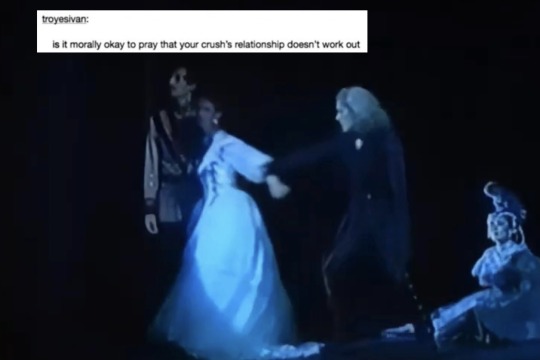
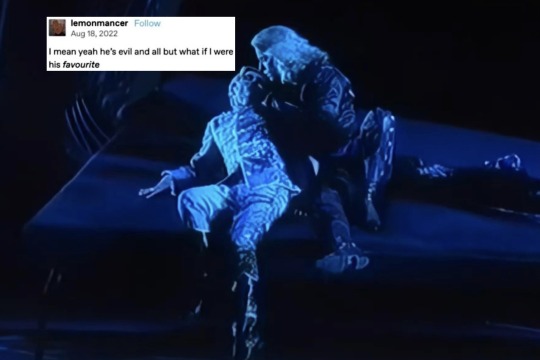
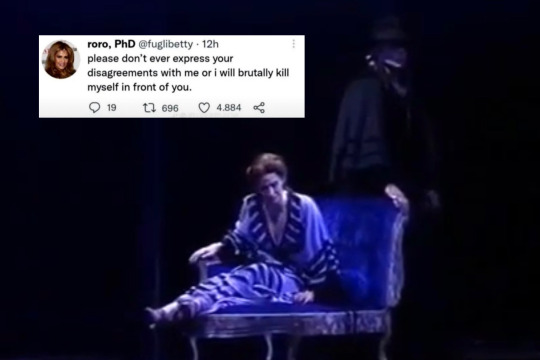
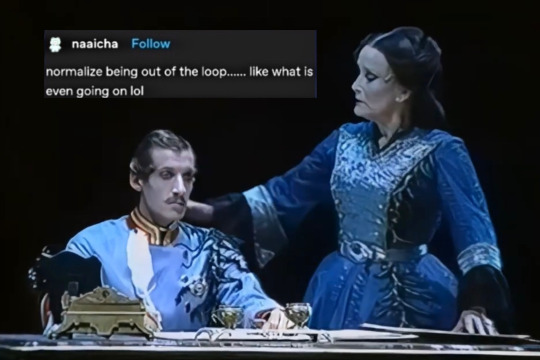
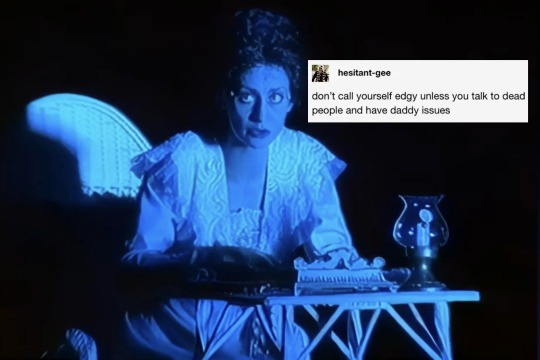

Kaiser Franz Joseph: Viktor Gernot, Kaiserin Elisabeth: Pia Douwes, Der Tod: Uwe Kröger (1992)
Kronprinz Rudolf: Andreas Bieber, Der Tod: Uwe Kröger (1992)
Kaiserin Elisabeth: Pia Douwes, Der Tod: Uwe Kröger (2002)
Kaiser Franz Joseph: Viktor Gernot, Erzherzogin Sophie: Else Ludwig (1992)
Kaiserin Elisabeth: Pia Douwes (1992)
Kronprinz Rudolf: Jonathan Späth, Der Tod: Mark Seibert (2012)
#elisabeth das musical#uwe kröger#pia douwes#andreas bieber#viktor gernot#else ludwig#mark seibert#german musicals#musicals#der tod
41 notes
·
View notes
Text
Thank you so much for your commentary, @josefavomjaaga! 🙏
I see… The waring parties at Austrian court strike again!
Klemens used the trump card he thought out at the moment but his actions couldn’t have passed unnoticed by others, as they tried to prevent his “cruel deeds” from coming to life. X)
Good time of day to you, ladies and gentlemen!
So, I made a promise in April that I never kept because of how insecure I felt about it for a long period of time. However, now I’m more than knowledgeable in terms of the subject and ready to full fill with immense pleasure that old pledge of mine. ✨
This post is dedicated to @microcosme11 and @usergreenpixel, since you’ve shown great interest in my proposition in the first place. :)
It all started with the discovery of a film “Hundert Tage” released in the year 1935. Its name speaks for itself as the movie covers Napoleon’s famous return from Elba in 1815 up to the battle of Waterloo. What’s fairly surprising is that Joseph Fouché, notorious ex-minister of police with many other regalia earned through the years of serving many masters, played a significant role in the plot (as he did in real life), despite usually having a somewhat ghostly presence in other pieces of Napoleonic media. In the “Hundert Tage” he is more than an active political player portrayed by Gustaf Gründgens, prominent German theater and film actor with his background being too controversial to ever make a non-biased sense of…
Anyhow, the thing is: the impersonation of Fouché wasn’t the first “Napoleonic” role Gründgens ever tried on during his artistic career. Exactly a year before that another film of Austrian (!) production was made where he starred in a role which suits his appearance and play style so well that I’m still blown away by such an impeccable choice.
The original title of the film is “So Endete eine Liebe” (1934) and it deals with the tragic story of erzherzogin Marie Louise, future wife of emperor Napoleon, being separated from her true love for the sake of an advantageous marriage and political alliance. The film cast is mainly Austro-German with two leading performers being Willi Forst, one of the most prominent Austrian actors in the 20th century, playing archduke Franz von Modena, and fore mentioned Gustaf Gründgens, an actor who was also born in the Westphalian region of Germany, playing… Klemens von Metternich in all his mischievous glory. 💅✨

The film itself is not friendly to people who aren’t ready to face the complexity of Habsburg’s incest-flavoured dramas at their finest (I myself wasn’t aware of the infatuation that Marie-Louise had for her uncle, if it ever took place at all [and I’m too lazy to check any decent biography about her to find out what did happen exactly]). BUT, but Gründgens’ Metternich is something else.
With due awareness and respect. 🧎♂️








This role was made for him, no doubt: even the film and its actors show appreciation for his grace at the first opportunity given. 😁
#historical film#so endete eine liebe#erzherzogin marie louise#klemens von metternich#napoleonic era#napoleonic wars#austrian empire#19th century
31 notes
·
View notes
Text

Sleeves alert !
(Erzherzogin Sophie in 'Elisabeth')
2 notes
·
View notes
Text
Letter from Marie Louise to her father
Written shortly after the "handover" ceremony in Sankt Peter close to Braunau. For this ceremony, a wooden building, divided into three parts (French - neutral - Austrian), had been constructed, usually referred to as the "three pavillions" or "three barracks". The leaders of the two delegations, Berthier and Trautmannsdorf, both signed the contract before the bride was handed over to the buyer bridegroom's delegation.
Dearest Papa! Forgive me for not immediately writing to you yesterday, as I should have done, but the journey, which was a little tiring and long, prevented me from doing so. Through Prince Trautmansdorf I have found another opportunity to write to you once more sincerely, and I am happy to seize it to assure you that I am constantly thinking of you and always will.
"Sincerely" here probably means "without measuring my words because I'm being spied upon by my new entourage".
God has given me the strength to endure happily even the last painful blow, the separation from all my loved ones, in Him alone I have all my trust, He will help me and give me courage, and I will find my reassurance in the consolation of having done my duty to you by making this sacrifice. Yesterday I arrived in Ried very late, still preoccupied with the thought that I might be separated from you forever. Today I arrived at two o'clock in the French camp in the barracks at Braunau, after staying in the Austrian barrack for some time, I moved to a throne in the neutral barracks, after the papers had been read, all my people kissed my hand, at that moment I really didn't know what I was doing, a cold shiver overcame me and I became so upset that the Prince of Neufchatel began to cry.
Which must have been a sight to behold: Berthier crying tears of emotion while his new empress starts to panic and desperately looks around for the emergency exit.
Prince Trautmansdorf handed me over to him [...]
... and a kleenex, too ...
[...] and my entire court was presented to me, oh God, what a difference between the French and Viennese ladies! --- The Queen of Naples came to meet me in the other room, I embraced her, and showed myself remarkably friendly towards her, but I do not quite trust her, I believe that it was not zeal for service alone that was the cause of her journey.
That's a very interesting first assessment of Caroline Murat. Marie Louise may have been less naive than she made herself out to be.
She travelled with me to Braunau, and here I had to hold a two-hour toilette, I assure you that I am already as perfumed as all the other French women.
Apparently, the difference mentioned above was largely attributable to odour.
The Emperor Napoleon has sent me a splendid golden robe, but he has not yet written to me - if I had to leave you, I would much rather be with him than travelling with all those ladies.
That's one thing that will remain true for a large part, I believe. With the one exception of the duchess de Montebello, she did not really appreciate the ladies of the French court (and Louise Lannes she apparently appreciated to some extent because she was not much suited for life at court).
Oh God, how I regret not being able to still spend the happy days with you, only now am I learning to appreciate them. I assure you, dearest Papa, that I am very sad and cannot yet console myself. I hope your catarrh will be completely over; I include you in my prayers every day. Forgive my poor scribbling, but I have so few moments to myself, I will kiss your hands a thousand more times and have the honour of being Dearest Papa! Your most submissive and obedient daughter Louise Braunau 16th March 1810
(Source: Helfert "Maria Louise, Erzherzogin von Österreich, Kaiserin der Franzosen", Wien 1873)
17 notes
·
View notes
Text
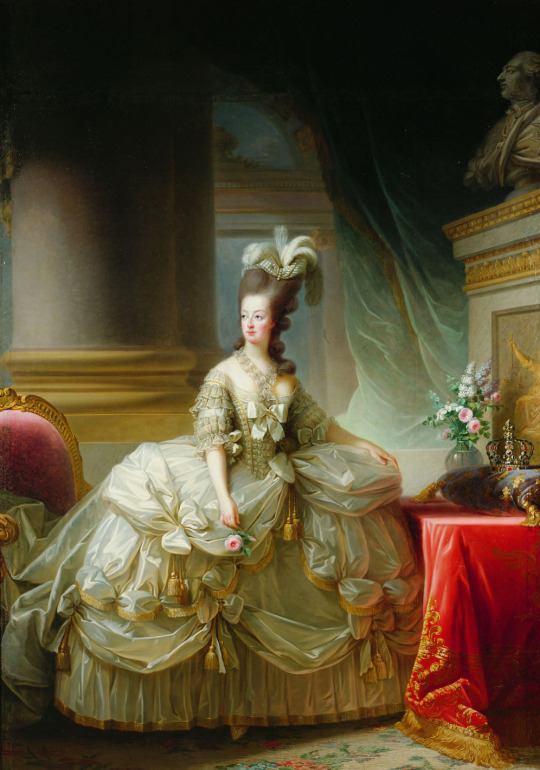
Oil Painting, 1778, French.
By Elisabeth Louise Vigée LeBrun.
Portraying Marie Antoinette in a cream court dress.
Kunst Historisches Museum Wien.
#elisabeth vigee le brun#khmw#Kunst historiches museum Wien#marie antoinette#french#France#1778#1770s#1770s France#court dress#court attire#1770s painting
33 notes
·
View notes
Text

The Family of Franz I of Austria. By Bernhard von Guérard.
The painting depicts Emperor Franz I. (1768-1835) with his third wife Maria Ludovica (1787-1816), who married in 1808 and their eight children: to the right, at the back seven-year-old Marie Luise (1791-1847), later Empress of the French, with her sister the seven-year-old Karolina Ferdinanda (1801-1832), later Queen of Saxony, and her brother the fifteen-year-old heir to the throne, Ferdinand (1793-1875), later Emperor Ferdinand I. To the left in the picture is seated the four-year-old Maria Anna (1804-1858), holding out her hand to her brother Franz Karl (1802-1878), who is two years older than her, and will be the father of Emperor Franz Joseph. At the back, the two girls embracing are Maria Klementina (1798-1881) at the age of ten and Leopoldine (1797-1826), later Empress of Brazil, who is a year older. On the lap of the Empress is the three-year-old Johann Nepomuk (1805-1809).
#bernhard von guérard#family portrait#kaisertum österreich#haus habsburg lothringen#bernhard von guerard#emperor franz i of austria#kaiser#kaiserin#empress maria ludovica#karolina ferdinanda of austria#archduchess#erzherzogin#archduke#erzherzog#empress leopoldine of brazil#marie louise d'autriche#empress of the french#empire français#império do brasil
8 notes
·
View notes
Text

Miniature Portait of Charlotte by Guglielmo Faija, 1857. Based on an original by Sir William Ross. The Royal Portrait Collection, London.
#guglielmo faija#william ross#sir william ross#house of saxe coburg and gotha#kingdom of belgium#erzherzogin#kaisertum österreich#haus habsburg lothringen#mexican empire#imperio mexicano#monarquías americanas#house of habsburg lorraine#mexican empress#charlotte of belgium
6 notes
·
View notes
Text
Images of 1910 in Fashion -
According to Wikipedia, "Geneviève Lantelme (born Mathilde Hortense Claire Fossey, 20 May 1883 – 24/25 July 1911) was a French stage actress, socialite, fashion icon, and courtesan. Considered by her contemporaries to be one of the most beautiful women of the Belle Epoque..."
1910 (November) Geneviève Lantelme in Paquin dress photo by Auguste Bert Le Théatre no. 286. From Wikimedia; fixed spots w Pshop 2489X3663.
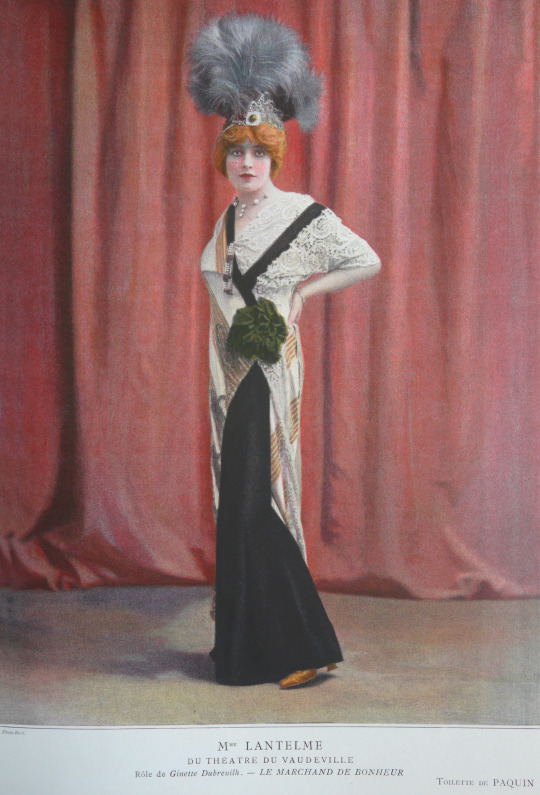
Left 1910 (Juin) Lantelme by Félix. From Wikimedia 1947X2868,
Right 1910 (june) Lantelme in Jeanne Lanvin dress photo by Félix Les Modes. From verbinina.wordpress.com/page/8/; fixed spots w Pshop 1864X2522.
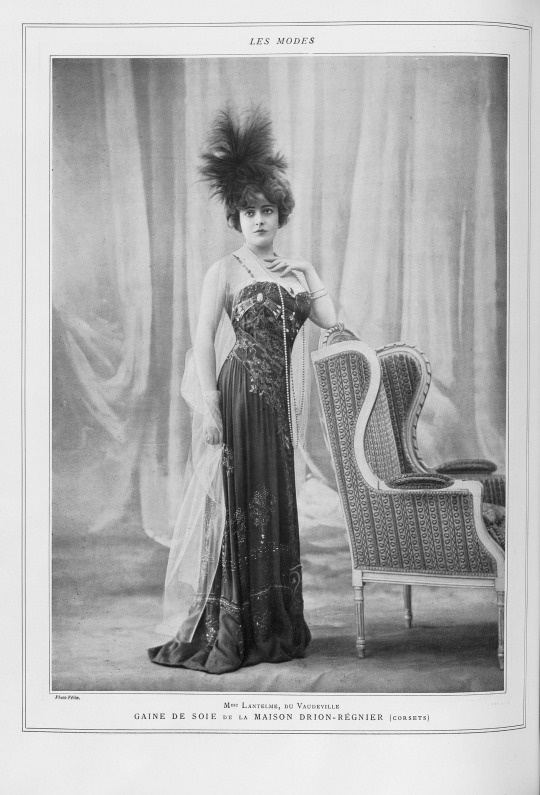

1910 (November) Femina cover Geneviève Lantelme wearing fur. From Wikimedia 1654X2068.
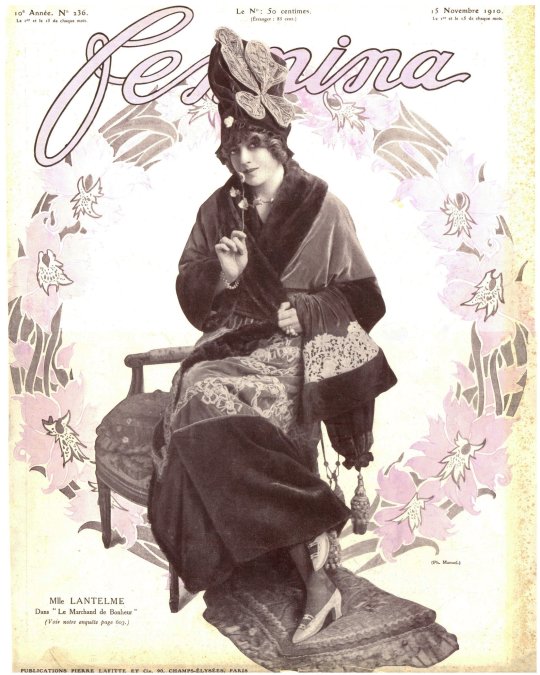
According to Wikipedia, "Joaquín Sorolla y Bastida (Valencian: Joaquim Sorolla i Bastida, 27 February 1863 – 10 August 1923)[a] was a Spanish Valencian painter. Sorolla excelled in the painting of portraits, landscapes and monumental works of social and historical themes. His most typical works are characterized by a dexterous representation of the people and landscape under the bright sunlight of Spain and sunlit water." He painted several portraits of his wife Clotilde and at least one of daughter Elena. He portrayed people on the beach in white or dressed in traditional black.
Left 1910 Clotilde con perro y gato by Joaquín Sorolla y Bastida (Museo Sorolla). From joaquin-sorolla.blogspot.com/2009/06/clotilde-sentada_04.html 1000X1600.
Right 1910 Clotilde con sombrero negro by Joaquín Sorolla y Bastida (Museo Sorolla - Madrid, Spain) photo - Ramón Muñoz. From the photostream of Ramón Muñoz on flickr; fixed spots & wrinkles w Pshop 1122X1732.

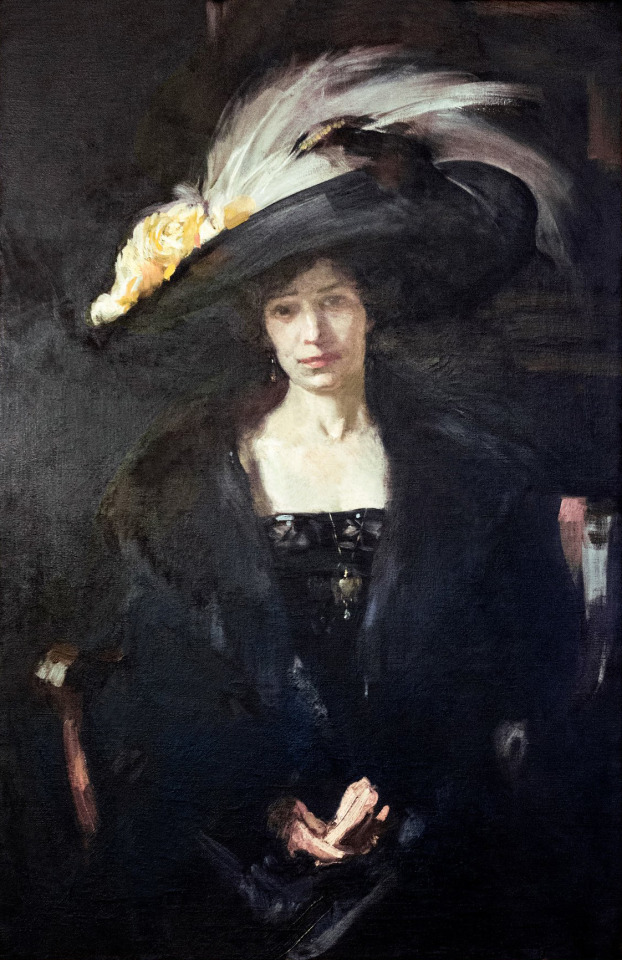
Left 1910 Clotilde con traje de noche by Joaquín Soroola y Bastida (Museo Sorolla - Madrid, Spain). From joaquin-sorolla.blogspot.com/2014/10/clotilde-con-traje-de-noche_5.html?m=1 1112X1600.
Right 1910 Clotilde sentada en un sofá by Joaquín Sorolla y Bastida (Museo Sorolla - Madrid, Spain). From Wikimedia; fixed spots w Pshop 1168X1932.


1910 Elena (Sorolla) con sombrero negro by Joaquín Sorolla y Bastida (private collection). From joaquin-sorolla.blogspot.com/2015/08/elena-con-sombrero.html?m=1 1198X1594.
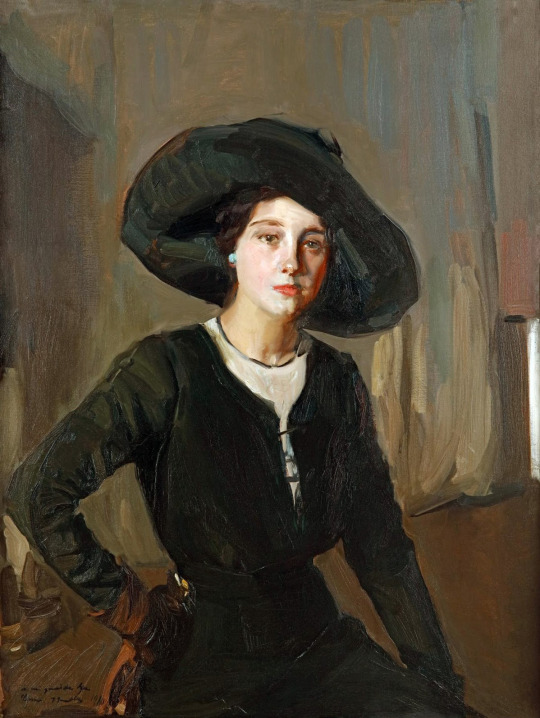
Left 1910 Comtesse de la de la Maitrie in equestrian dress by Charles Albert Walhain (private collection) From liveinternet.ru/journalshowcomments.php?jpostid=319050317&journalid=4507805&go=prev&categ=0 950X1679.
Right 1910 Erzherzogin Maria Therese by H. C. Kosel. From eBay; removed mono-color tint 675X1061.
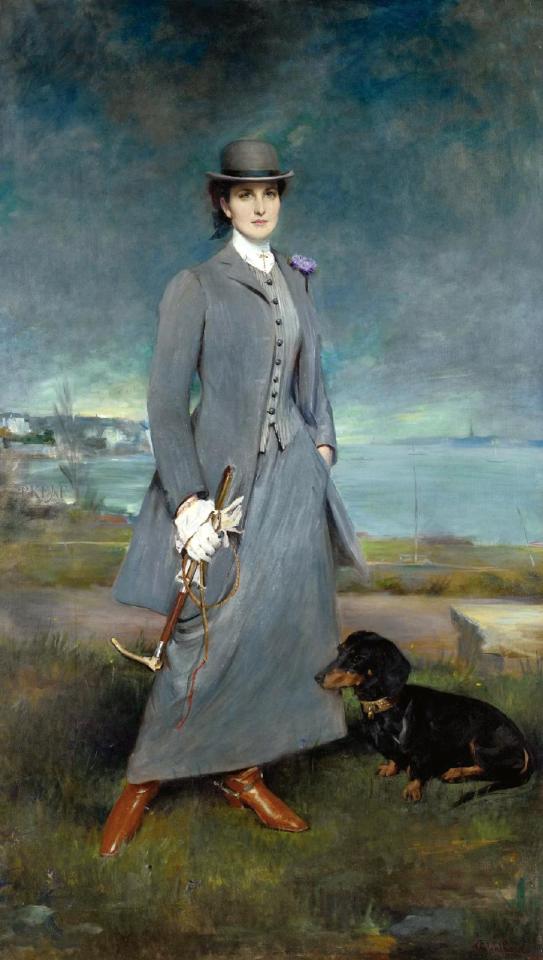

Left 1910 Lady Elsie Duveen, née Salamon by François Flameng (Ferens Art Gallery - Kingston upon Hull, East Riding of Yorkshire, UK). From artrenewal.org/artists/francois-flameng/158 2016X2610 @144 4.9Mp.
Right 1910 Madame Von Bodenhausen avec son enfant Luli by Theo van Rysselberghe (private collection). From the discontinued Athenaeum Web site 721X889.
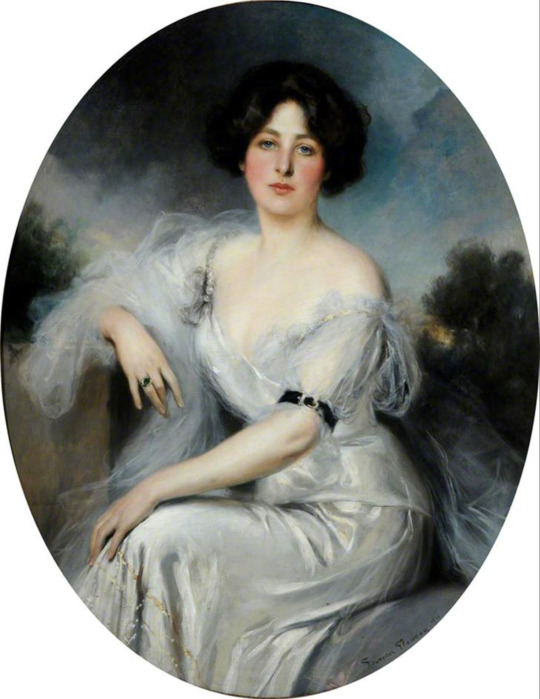

#1910s fashion#1910 fashion#Belle Époque fashion#Edwardian fashion#Geneviève Lantelme#Jeanne Paquin#Auguste Bert#Le Théatre magazine#feather headdress#jeweled headdress#Félix#Jeanne Lanvin#veil#Femina magazine#Joaquín Sorolla y Bastida#Clotilde Sorolla#jacket#hair flowers#Elena Sorolla#Comtesse de la de la Maitrie#equestrian dress#Charles Albert Walhain#François Flameng#boots#vest#Erzherzogin Maria Therese#H. C. Kosel#Elsie Duveen#Madame Von Bodenhausen#Theo van Rysselberghe
10 notes
·
View notes
Text
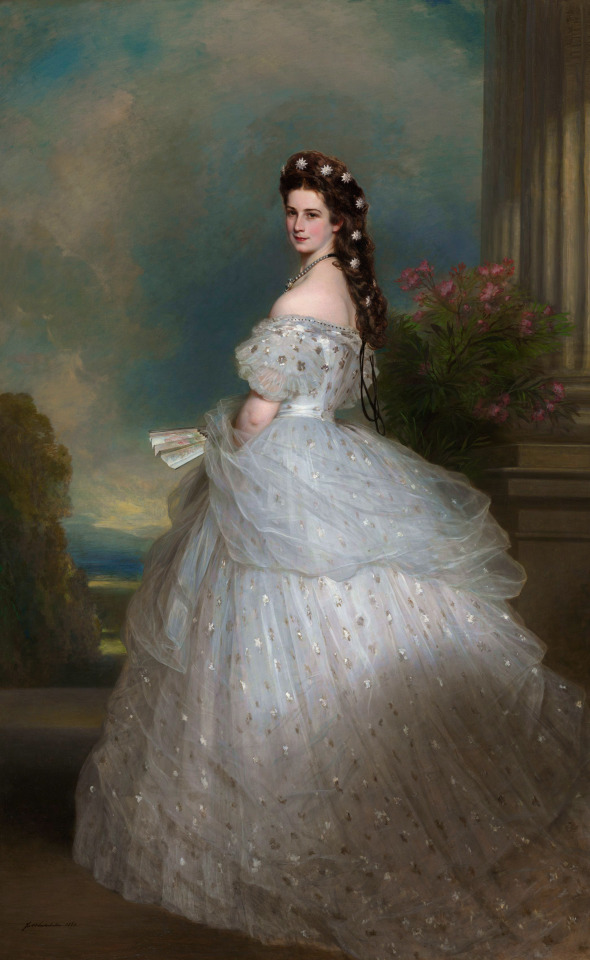
Archduchess Sophie to her son Archduke Maximilian, February 5 of 1863: The ball was said to have been very beautiful, as always at Alphons Pallavicini’s, and Sisi looked delicious in a light white dress interwoven with stars in matte silver and the diamond stars in her hair that look so good on her... At the court ball, Sisi’s dress was pinned all round with diamonds and rubies. I say this later because you and your wives [Archuke Karl Ludwig and his wife Maria Annunziata were staying in Trieste with his brother and sister-in-law] might be interested in jewellery and toilets.
Praschl-Bichler, Gabriel (2008). Unsere liebe Sisi. Die Wahrheit über Erzherzogin Sophie und Kaiserin Elisabeth (Machine translation. Please keep in mind that a lot of nuance may/will be lost)
Sisi’s success was overwhelming. In 1864, for example, she went to Dresden for her brother Karl Theodor’s wedding. After the court ball. Archduke Ludwig Viktor reported to Vienna that Sisi was “stunningly beautiful, also the people here acted insane. I have never seen anyone having such an effect before.” Sisi wore a white dress embroidered with stars, her famous large diamond stars in her hair, on her breast a corsage of camellias. Her sister “Helene, a very pale copy of the Empress, in a star dress also,” wrote Ludwig Viktor. At the wedding, the main attraction was not the bride, but Elisabeth. This time she appeared in a lilac dress embroidered with silver clover leaves, with a cape of silver lace, a diamond tiara on her intricately dressed hair. Ludwig Viktor: “the people here are so flabbergasted at our lady sovereign!!! they’re right.”
Hamann, Brigitte (1986). The Reluctant Empress: A Biography of Empress Elisabeth of Austria (translation by Ruth Hein)
#1863 mention of the star dress!! (if it's even the same. i choose to believe it is)#also reasons why i should be allowed to write a sisi series: i will have both elisabeth and helene in the star dress#(and helene WILL also look stunning in it idc what ludwig viktor said)#empress elisabeth of austria#helene in bavaria hereditary princess of thurn und taxis#historicwomendaily
54 notes
·
View notes
Text

💍🫧👑✨🎨🖼🖍✏️
𝐏𝐨𝐫𝐭𝐫𝐚𝐢𝐭 𝐨𝐟 𝐌𝐚𝐫𝐢𝐚 𝐓𝐡𝐞𝐫𝐞𝐬𝐚 𝐨𝐟 𝐀𝐮𝐬𝐭𝐫𝐢𝐚 (𝟏𝟖𝟎𝟏-𝟏𝟖𝟓𝟓) 𝐛𝐲 𝐏𝐢𝐞𝐭𝐫𝐨 𝐁𝐞𝐧𝐯𝐞𝐧𝐮𝐭𝐢, 𝟏𝟖𝟏𝟕.
She was the daughter of Ferdinand III, Grand Duke of Tuscany, and Luisa of Naples and Sicily. In 1817 she married Charles Albert of Sardinia, future King of Sardinia.
#houseofhabsburg #habsburgowie #hausösterreich #habsburglorraine #habsburglothringen #habsburg #arcyksiężniczka #archduchessofaustria #archiduquesa #архикняжна #erzherzogin #erzherzoginvonösterreich #houseofsavoy #queenofsardinia #principessaditoscana #reginadisardegna #casasavoia #pietrobenvenuti
0 notes
Text
« Der Tagesablauf · Teil 2 »
Kaiser Franz Joseph von Österreich
Um neun Uhr meldete sich sein Generaladjutant zur Audienz, dem der Chef der Militärkanzlei und der Obersthofmeister folgten. Danach kamen die Minister und zweimal wöchentlich fanden die allgemeinen Ministerratsitzungen statt, die im Konferenzzimmer abgehalten wurden. Sein Leibkammerdiener in den letzten zwölf Jahren, Eugen Ketterl, berichtete, dass Franz Joseph in seinen späten Jahren sehr wohl an der Wahrheit interessiert war und Aufrichtigkeit und Offenheit schätzte. Böse konnte er seinem Kammerdiener zufolge nur werden, wenn er entdeckte, dass man Dinge vor ihm verheimlichen oder vertuschen wollte. Ebenso war er an der Stimmung in der Bevölkerung interessiert: Ketterl berichtete, dass der Kaiser vor allem morgens beim Ankleiden immer über alles informiert werden wollte. Ob dies mit den Vorwürfen seines Sohnes und dessen tragischem Selbstmord in Zusammenhang steht, sei dahingestellt. Ketterl machte sich überhaupt bei der Hofkamarilla äußerst unbeliebt, da er sich bemühte, den Kaiser aus seiner eigentlich unfreiwilligen und vom Hof aufgezwungenen Isolation zu lösen. Erzherzogin Sophie hatte diese isolierte Stellung ihres Sohnes bis zuletzt forciert und Franz Joseph war nie der Gedanke gekommen, sich dagegen aufzulehnen. Erst in den späten Jahren brachte ihm Ketterl zum Beispiel Zeitungen und Artikel, die man dem Kaiser sonst streng vorenthielt, und übermittelte ihm vieles, was er normalerweise nie zu hören oder sehen bekommen hätte.
Punkt zwölf Uhr wurde das Mittagessen serviert. Es bestand aus einer Suppe, Rindfleisch mit Gemüse, Beefsteak oder Geflügel und dazu ein Glas „Spaten-Bier“. Franz Joseph nahm sein Mittagessen immer auf seinem Schreibtisch ein, um keine wertvolle Zeit zu vergeuden und danach gleich wieder weiterarbeiten zu können. Ketterl war oft erbost, dass Franz Joseph ausgerechnet in dieser kurzen Zeit des Mittagessens von Mitgliedern der Kabinettskanzlei mit „dringenden“ Berichten gestört wurde und verhalf dem Kaiser mit einer eher außergewöhnlichen Maßnahme zu einer kurzen Mittagspause: er versperrte kurzerhand die Tür des Arbeitszimmers.

1 note
·
View note